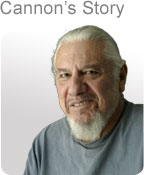Cannon’s Story
Former offenders are subject to a wide range of rules and regulations that hamper their ability to find employment and stay employed.
 Unless his civil rights have been restored, a felon is disqualified from over a million jobs in the Florida economy. Regardless of the nature of his crime, these restrictions prevent a felon from working in nursing, as a construction contractor, a security guard, a notary or pest control operator as well as other jobs. The state has adopted at least twelve different approaches to restrict the employment opportunities of former offenders; it is estimated that these restrictions may affect over 600,000 potential Florida workers.
Unless his civil rights have been restored, a felon is disqualified from over a million jobs in the Florida economy. Regardless of the nature of his crime, these restrictions prevent a felon from working in nursing, as a construction contractor, a security guard, a notary or pest control operator as well as other jobs. The state has adopted at least twelve different approaches to restrict the employment opportunities of former offenders; it is estimated that these restrictions may affect over 600,000 potential Florida workers.
Even without such restrictions many employers are reluctant to hire people with a criminal record.
Competition for entry-level and low-skilled jobs increases these difficulties. Steady employment is known to be an essential element in keeping former offenders out of prison and back on track to a law-abiding lifestyle.
After serving several years in the federal prison system, I was released into a halfway house. I was told that I’d have to find a job within two weeks or I’d be returned to prison. While looking for a job, I had to report where I was going, the time I was leaving the halfway house, and my means of transportation: bus, train, taxi, or automobile. I was fairly lucky in that my family had given me a very inexpensive car which I was approved to use by the authorities at the halfway house after my first week.
When I arrived at the job interview site, I had to call the authorities at the halfway house to let them know I had arrived. After the interview, I had to call and tell them I was heading back to the halfway house. They had a pre-determined time frame in which I had to be back at the house; if I arrived outside of that time frame, they could consider it an escape and I would be returned to prison.
My work history was in the motorcycle industry. That’s what I knew so I looked for a job within that industry. Unfortunately for me, many owners of motorcycle companies had had previous run-ins with the law and, because they had felony convictions, I was restricted from working for them. I had to turn down several full-time, permanent job offers and found it more and more difficult to find a job within the two week time frame to avoid being sent back to prison. Just before the two weeks were up, the authorities saw that I was actively and sincerely looking for work and gave me an extension on the time frame.
Finally, I was given a break. I found a job at a motorcycle shop making $125 for a forty hour work week. It fulfilled the requirements of the halfway house to have a job but I spent the next six months looking over my shoulder: with all the rules I had to follow, the goal seemed to be to send people back—not help them succeed.
Luckily for me, I had friends and family who were there for me. They had given me the car to use, gave me extra money, and gave me a place to stay when I was released from the halfway house and put on a bracelet [made to wear an ankle monitor]. If it wasn’t for the friends and family, I probably wouldn’t have made it through the halfway house experience and would have been sent back to the federal system.
I truly believe that Project 180 is the friends and family that most of us need upon our release and will go far in helping us become providers for ourselves and our families.

 Our goal is to reduce the impact of repeat offenders upon public safety, public spending, Florida families and individual lives.
Our goal is to reduce the impact of repeat offenders upon public safety, public spending, Florida families and individual lives.